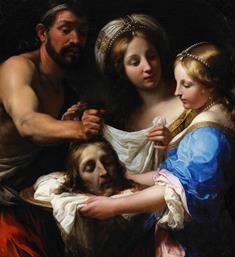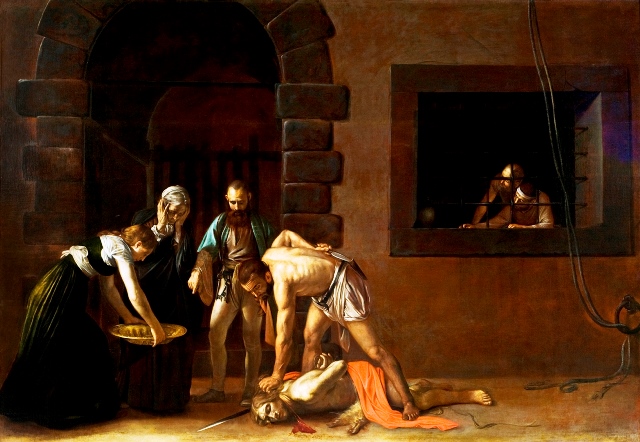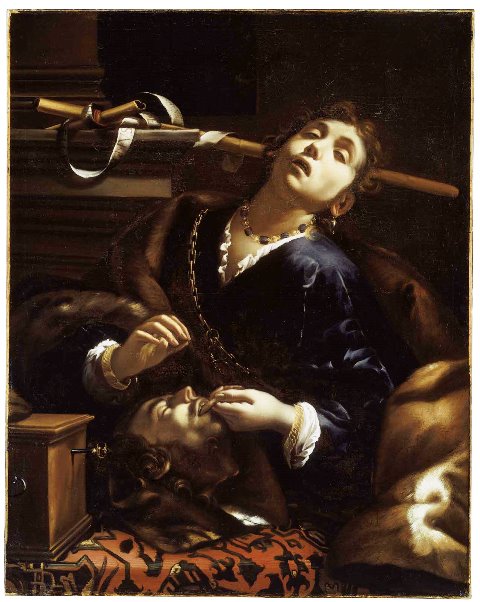 We celebrate liturgically the births of Our Lord (25 December), His Blessed Mother (8 September) and the prophet who was more than a prophet, the greatest man ever born of a woman (Matthew 11:9-11; Luke 7:28), St John the Baptist (+24 June 28-29). On 29 August we celebrate the Beheading of St John, murdered by a feckless politician, the pusillanimous Tetrarch Herod. John was imprisoned because he denounced Herod’s illicit, sinful “marriage”. Herod then had John killed because, blinded by lust for his niece, he was too craven to back down from a rash offer he blurted in his lechery.
We celebrate liturgically the births of Our Lord (25 December), His Blessed Mother (8 September) and the prophet who was more than a prophet, the greatest man ever born of a woman (Matthew 11:9-11; Luke 7:28), St John the Baptist (+24 June 28-29). On 29 August we celebrate the Beheading of St John, murdered by a feckless politician, the pusillanimous Tetrarch Herod. John was imprisoned because he denounced Herod’s illicit, sinful “marriage”. Herod then had John killed because, blinded by lust for his niece, he was too craven to back down from a rash offer he blurted in his lechery.
St Augustine of Hippo (+430) in s. 380 reflects on how John was martyred for Christ because he was murdered for the Truth. England’s own Venerable Bede (+735) preached, “St John gave his life for [Christ]. He was not ordered to deny Jesus Christ, but was ordered to keep silent about the Truth”.
Speaking the truth to power, and to wider society, about sexual mores, about illicit and immoral unions, can earn you a close haircut. In the Church, asking too many questions about objectively confusing problems can earn you a … shave.

And yet, the “greatest man ever born of a woman” bore witness to the Truth. It is the right thing to do. The lives of martyrs are no less examples for imitation today than they were when they were fresh models to our ancient forebears in the Faith.
In 2012, Benedict XVI taught about the martyrdom of the Baptist in a General Audience. He said,
“Celebrating the martyrdom of St John the Baptist reminds us too, Christians of this time, that with love for Christ, for his words and for the Truth, we cannot stoop to compromises. The Truth is Truth; there are no compromises. Christian life demands, so to speak, the ‘martyrdom’ of daily fidelity to the Gospel, the courage, that is, to let Christ grow within us and let him be the One who guides our thought and our actions. However, this can happen in our life only if we have a solid relationship with God.”
Speaking of speaking truth to power, to paraphrase Edmund Burke (+1797), in Thoughts on the Cause of the Present Discontents (1770), the only thing necessary for the triumph of evil is for good men to do nothing. United in prayer and our Faith, we must together bear witness to the Truth in our troubling times, as martyrs and confessors did in theirs.

You might momentarily be deceived into thinking that this is a portrait of a certain writer at the Fishwrap, prone to swoons. Instead, however, it is
Herodias with the Head of Saint John the Baptist
The ecstatic adulteress is in the very act of mutilating with a pin the tongue that named her sin.
Francesco del Cairo (1598–1674)


































But surely, but surely….he could have kept his head if he hadn’t been so rigid. Why didn’t he dialogue and start a process of discernment?
Is there a lesson here for Henry VIII (and his descendent ecclesial community members) and for the modern Kasperites (‘maybe those African clerics shouldn’t speak so much about marriage”) and Spadarites (2+2=5) and Tucho-Fernándites (“Heal me with your mouth”…bleh)?
All snark aside, I would love to hear how the curresnt Holy Father discusses this Feast at sermon…as you said, dear Father, “the greatest man ever born of a woman” was martyred for speaking against sins against the sanctity of marriage…this sort of feast has awkward sidestepping an spin written all over it.
Pingback: Johannes døperens martyrdød » EN KATOLSK WEBLOG
The interesting thing here is Herod who despite being uneasy did not want to break his word or look bad in front of his friends and so chose the act that was against God and had John beheaded.. On the contrary John is in prison for refusing to compromise and for calling a spade a spade. When he sees something that could compromise another’s soul, he calls it out.
How many times have I refused to call out what is clearly sinful and dangerous for fear of appearing contrary to public opinion, being scolded or appearing to be judgmental?